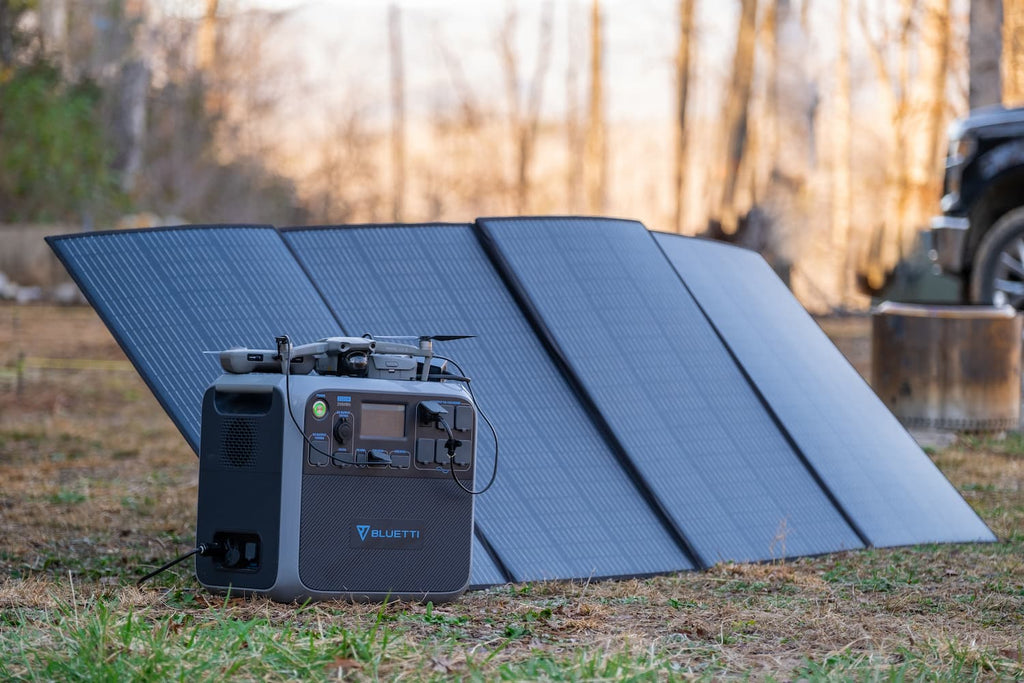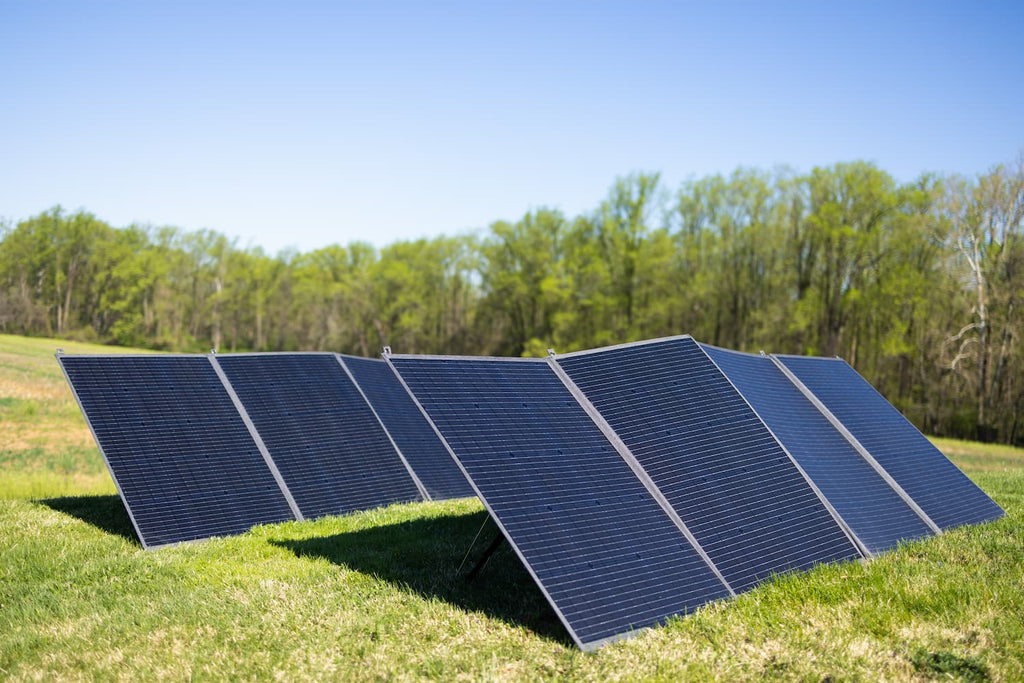Let’s bust a myth for you: the solar panels work on cloudy or rainy days. It’s just that the power production is low or negligible. Curious? The solar panels depend on light, not the sun. If there's enough light to aid photovoltaic conversion, the solar panels will produce power. But practically, there’s no use of solar panels during a rainy day or night. A bright sunny day makes a good solar day; your solar panels will run efficiently at their full capacity.
Let’s explore a little more about solar panels operations in low light i.e., during cloudy days, rainy days, or at night. It would be better if you understood solar technology and its science. This blog covers everything you should know about solar panels, their working, and the best alternatives to use when solar energy is unavailable. Recap your question; we’ll also bust some more myths about solar panel operations.
The Science Behind Solar Panels
The scientific term behind the working of solar panels is photovoltaic conversion. It may sound technical, but it isn’t. Simply, photovoltaic conversion is a process that converts solar energy into electricity with the help of photovoltaic (PV) cells. There are hundreds of PV cells on a solar panel, those small dots that you may have noticed. All these PV cells work on the same principle.
What are PV cells?
You can consider Photovoltaic (PV) cells as electronic devices, like a capacitor in the fan or a transistor in your phone. They’re made up of silicon, the chemical name for sand. Because silicon has semiconductor properties, it can conduct and resist electricity. The magic in PV cells is their ability to conduct electricity when in contact with sunlight.
Photovoltaic Conversion Process
When light strikes a PV cell in a solar panel, it is absorbed by the cell and converted to electricity. Without going into technical terms, the process is like consuming food to get the energy to live. Each cell produces ions that combine and generate enough electricity to fulfil your power needs.
How Does Electricity Flow in Solar Panels?
The ions generated in the solar panel create a potential which drives the electricity. If your solar panel is connected to an external circuit like an inverter, the electricity will flow from the panel to the inverter. Since home appliances and devices operate on AC power, the inverter will convert DC power to AC. The electricity from the solar panel will then power your home.
Average Electricity Generated by Solar Panel
The solar panel output is measured in watts. The single PV cell can generate about 8-10 watts, and the total rated output of the solar panel is between 200-400 watts or even higher. That’s how much a single panel generates on average. The normal house consumes about 8-10 Kilo-watts. With simple math, you could see that around 20-25 solar panels can meet this need effectively.
Can Solar Panels Work on Cloudy or Rainy Days?

At the core, solar panels do work on cloudy or rainy days. But the power generation reduces significantly with the unavailability of sunlight. The photovoltaic conversion process doesn’t necessarily need direct sunlight; if there’s good lighting, the panel will generate power, but at reduced levels.
For a better understanding, consider a solar panel that produces 400W to 420W on a sunny day; the same panel will produce 100W or even less on a cloudy day. It’s because there’s good light even if the sky is cloudy. To your surprise, many states with the most cloudy days have a high number of solar consumption.
The Myth Busted: Many people believe that solar panels work best when it’s too sunny. That’s not the case. During sunny days, the temperature tends to rise, which affects the solar panel performance. It may be shocking for you that solar efficiency drops by 10-15% when the surface temperature of the panel exceeds 25 degree-celsius. If you have a solar system in the home, you may check the difference in power generation levels when it gets too hot.
Solar Panels During the Night
Like humans, solar panels sleep during the night. They wouldn’t work 24/7 tirelessly to power your house. You will need to have some other alternative like battery storage or grid supply for continuous power. The solar panels need light; since there’s no light during the night, the panels won’t work.
You may be thinking about moonlight; it does help generate power from solar panels, but the output is not sufficient. The moon doesn’t have its own light; instead, the light from the sun is reflected on the moon. The light intensity is very low and doesn’t aid the photovoltaic conversion process.
You can overcome this drawback by using solar batteries. The power generated during the day can be stored on batteries for night use. You can stay worry-free and fully enjoy energy independence with solar power.
How to Fulfill Power Needs on a Bad Solar Day
A bad solar day occurs when the sky is cloudy throughout the day. Your system cannot generate enough power to fulfil your needs. There are multiple ways to tackle a bad solar day, all you need is smart alternatives and good decisions. Let’s see how you can fulfil power needs on a bad solar day;
Reduce Consumption
Imagine you wake up in the morning and find out it’ll be a rainy day. The first thing you should do is reduce power consumption. If there are two lightbulbs turned on, you should turn off one. The more you save, the better you’ll be able to fulfil your power needs. Similarly, if you’d planned to do laundry, reschedule the chore to some other day. These smart decisions will help you avoid trouble.
Battery Storage
Batteries make solar power much more reliable. You can store the power according to your requirements and use it when needed. The solar batteries are not just for the night, they also help during a bad solar day. It’s recommended to have a slightly higher battery capacity than required to account for uncertainties. If you have good capacity, you can double the reliability of solar power.
Grid Supply
If you think there’s no way solar can generate enough power to fulfil your needs, you may shift to grid supply. It’s necessary that your system is connected to the grid. When you install a solar system, you get the option for net metering. It allows you to sell excess power to the grid but also get back the supply when needed. It’s a good deal and minimizes reliance on solar energy, especially when it’s a bad solar day.
Explore the Best Solar Panel Technology
BLUETTI is the world's leading manufacturer of top-quality solar panels. It offers advanced monocrystalline panels with high efficiency and superior protective layering. If you want to experience true energy independence with solar energy, the BLUETTI power solutions should be your go-to option.
You can level up your sustainable power solutions with cutting-edge solar panels. They’re the core of solar systems used to power homes. Let’s explore BLUETTI solar panels you can buy to embrace energy independence. Go green, use clean solar energy!
BLUETTI PV200D Solar Panel

The BLUETTI PV200D is a 200W solar panel with high efficiency and durability. It has an IP65 rating for enhanced protection against harsh weather. The design is portable and foldable for convenient use and space saving. You can use the panel when camping, driving, or hiking. It can combine with a powerstation to fulfill your power needs. The panel has a high conversion rate and allows 95% light transmittance. It can prove a game-changer for you!
BLUETTI PV350 Solar Panel

The BLUETTI PV350 Solar Panel has 350W capacity to fulfill your growing power needs. It has easy plug-in compatibility with BLUETTI power stations. The panel design is portable and foldable to carry along and use conveniently. The angle adjustment with the stand mechanism allows easy setup and optimal use. The panel has a high conversion rate and up to 23.4% efficiency. You can combine it with any BLUETTI power station to unleash the power of solar energy.
BLUETTI PV420 Solar Panel

The BLUETTI PV420 Solar Panel is made from A+ grade monocrystalline cells. It has an enormous capacity of 420W and high efficiency. The panel is highly durable, with an ETFE coating for protection against weather harm. The panel has IP65 ratings to prevent dust and water damage. Its design is portable and foldable for convenient use. The solar panel is highly compatible with power stations.
Final Thoughts
So, you got your answer, the solar panels do work on cloudy or rainy days. We also busted a couple of myths about solar panels. There’s no rocket science in solar panel operation, it’s simple and straightforward. You can build on the information to decide whether to embrace solar energy or not. Make sure you don’t outweigh the negatives because there are sustainable alternatives that reinforce solar energy reliability. Signing off!








































































